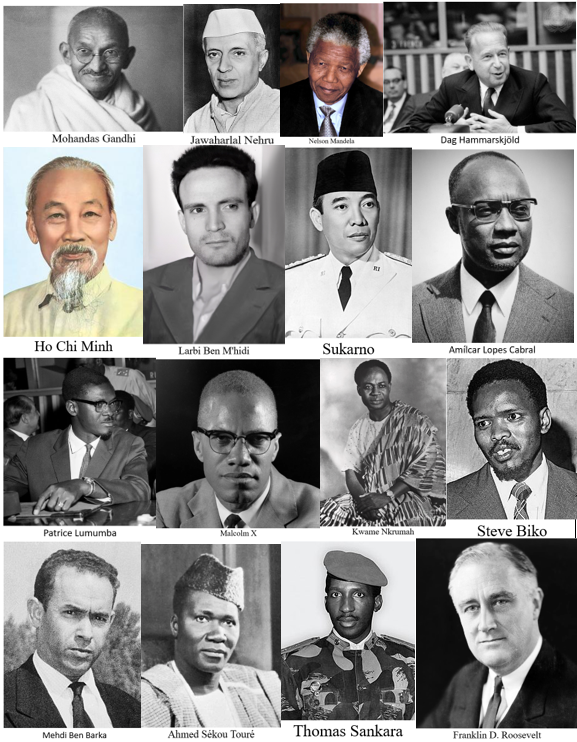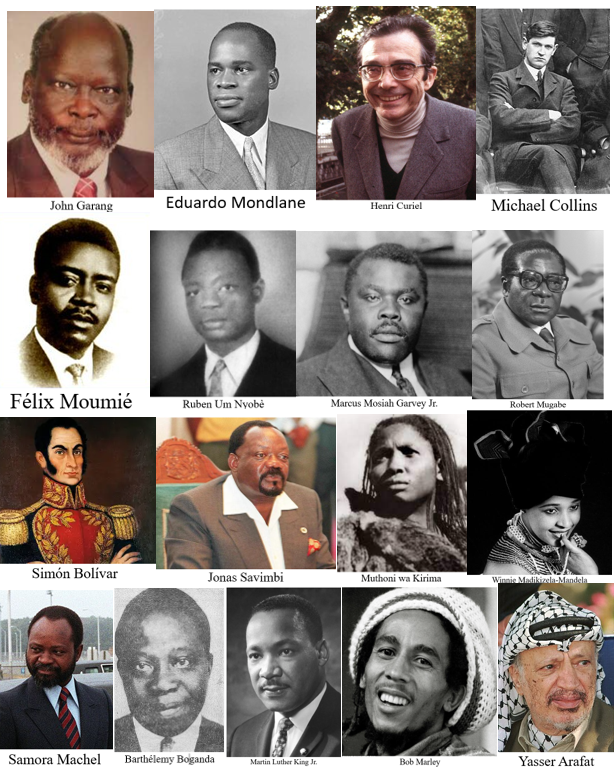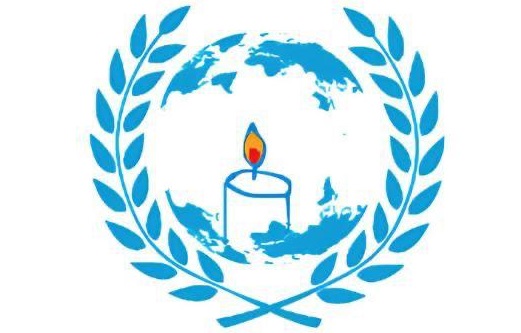Decolonization Hall of Fame
WCM seeks to recognize the giants of history – who faced down colonization with sturdy alliances and enduring convictions. As keeper of that legacy, and with humble gratitude, WCM pledge to honor their sacrifice and educate their legacy through its Decolonization Hall of Fame.
e pledge to e pledge to

Dag Hammarskjöld
The second United Nations Secretary General Dag Hammarskjöld died mysteriously for challenging colonial powers continued attempts to quell the quest for decolonization and for the principles of human freedom and human dignity on which the U.N. was founded.
One of the most enduring mysteries in United Nations history was the mysterious 1961 plane crash that killed Secretary-General Dag Hammarskjöld and all on board as he sought to broker peace in the Congo. This mystery lingers on, with the latest assessment suggesting that “specific and crucial” information continues to be withheld by a handful of powerful UN Member States.
Patrice Lumumba
Patrice Émery Lumumba was the first prime minister of the Democratic Republic of the Congo from June until September 1960, when he was assassinated for asking Belgian colonial authorities to leave Congo
Steve Biko
Steve Biko was an anti-apartheid, anti-colonial activist and an African nationalist who spearheaded the Black Consciousness Movement in South Africa before the Apartheid police murdered him.
Barthélemy Boganda
Barthélemy Boganda was the first Premier of the autonomous territory – Central African Republic until he died in a mysterious plane crash.
Mehdi Ben Barka
Mehdi Ben Barka was a Moroccan anti-imperialist and an opponent of French imperialism. He “disappeared” in Paris in 1965.
Amílcar Cabral
Amílcar Lopes Cabral was a Bissau-Guinean and Cape Verdean political organizer, and diplomat. A pan-Africanist, intellectual nationalist, revolutionary poet and one of Africa’s foremost anti-colonial leaders, he was assassinated in January 1973.
Eduardo Mondlane
Eduardo Chivambo Mondlane was a Mozambican revolutionary anthropologist and founder of the Mozambican Liberation Front. He served as FRELIMO’s first leader until his assassination in 1969 in Tanzania.
Kwame Nkrumah
Francis Kwame Nkrumah was a Ghanaian politician, political theorist, and revolutionary. He served as Prime Minister of the Gold Coast from 1952 until 1957, when it gained independence from Britain. He was then the first Prime Minister and later President of Ghana from 1957 until 1966. He died in 1972, from an unknown but apparently incurable sickness.
Henri Curiel
Henri Curiel was a left-wing political activist in Egypt and France. He led the communist Democratic Movement for National Liberation, and aided the Algerian Front de Liberation Nationale, as well as other national liberation causes, including those in South Africa and Latin America. In 1978, he was assassinated in Paris; his murderer has never been identified.
Thomas Sankara
Thomas Isidore Noël Sankara was a Burkinabe military officer, Marxist revolutionary, and Pan-Africanist who served as President of Burkina Faso from 1983 until his assassination in 1987.
Félix-Roland Moumié
Félix-Roland Moumié was an anti-colonialist Cameroun leader, assassinated in Geneva on 3 November 1960 by an agent of the SDECE (French secret service) with thallium after he succeeded as leader of the Union des Populations du Cameroun (UPC).
Ahmed Sékou Touré
Ahmed Sékou Touré was a Guinean political leader and African statesman who was the first president of Guinea from 1958 until his death in 1984. Touré was among the primary Guinean nationalists involved in gaining his country’s independence from France.
Ruben Um Nyobè
Ruben Um Nyobè, known as the forgotten father of Cameroun, was an anti-colonialist Cameroun leader, slain by the French army in September 1958 near his natal village of Boumnyebel in Douala-Cameroun.
Malcolm X
Malcolm X was an African American revolutionary, Muslim minister and anti-imperialist human rights activist who was a prominent figure during the civil rights movement until his assassination in 1965.
Marcus Garvey
Marcus Mosiah Garvey Jr. was a Jamaican political activist and the founder and first President-General of the Universal Negro Improvement Association and the African Communities League. Garvey was ideologically a Black nationalist and Pan-Africanist. He died in London on June 10, 1940.
Mohandas Gandhi
Mohandas Karamchand Gandhi was an Indian lawyer, anti-colonial nationalist, and political ethicist who employed nonviolent resistance to lead the successful campaign for India's independence from British rule. He inspired movements for civil rights and freedom across the world. He was assassinated in January 1948, in New Delhi, India.
Jawaharlal Nehru
Jawaharlal Nehru was an Indian anti-colonial nationalist, secular humanist, social democrat, author, and statesman who served as the country's first Prime Minister from 1947 to 1964, a period of 16 years. He was a central figure in India during the middle of the 20th century.
Nelson Mandela
Nelson Rolihlahla Mandela was a South African anti-apartheid activist and politician who served as the country's first president from 1994 to 1999. An African nationalist, anti-colonialist, and socialist, he was the country's first black head of state and the first elected in a fully representative democratic election.
John Garang
John Garang De Mabior was a Sudanese politician and revolutionary leader. A developmental economist by profession, Garang was one of the major influences on the movement that led to the foundation of South Sudan's independence from the rule of Sudanese president Omar al-Bashir. He served as First Vice President of Sudan for three weeks, from the comprehensive peace agreement of 2005 until he died in a mysterious helicopter crash on July 30, 2005.
Ho Chi Minh
Among the 20th Century revolutionaries, Ho Chi Minh waged the longest — and in terms of human lives sacrificed, the costliest — battle against colonial power. The forces he led fought and defeated the Japanese, the French, and finally the Americans in his fight for Vietnamese independence. He led the Viet Minh movement and became the president of North Vietnam following the declaration of independence from French colonial rule in 1945; he is widely considered one of the most influential communist leaders of the 20th century.
Larbi Ben M'hidi
Larbi Ben M'hidi was an Algerian revolutionary and prominent figure during the Algerian War of Independence. A co-founder of the Front de Libération Nationale, a political party and revolutionary movement in Algeria, Larbi was a national hero who was captured and summarily executed by the French Army.
Sukarno
Sukarno, also known as Kusno Sosrodihardjo, was an Indonesian statesman, orator, revolutionary, and nationalist who was the first president of Indonesia, serving from 1945 to 1967. A prominent leader of the Indonesian struggle for independence from Dutch colonialists, he spent over a decade under Dutch detention until the invading Japanese forces in World War II released him. Upon Japanese surrender, Sukarno and Mohammad Hatta declared Indonesian independence on 17 August 1945, and Sukarno was appointed president. He led the Indonesian resistance to Dutch re-colonization efforts via diplomatic and military means until the Dutch recognition of Indonesian independence in 1949.
Franklin Delano Roosevelt
Franklin Delano Roosevelt was the 32nd president of the United States, serving from 1933 until he died in 1945. He is the longest-serving president and the only president to have served more than two terms. An essential part of Roosevelt’s foreign policy was a vigorous and persistent opposition to colonization. His Atlantic Charter affirmed the right of all peoples to choose their form of government. He called on European colonialists to liberate their colonies towards independence. He officially withdrew US forces from Haiti in 1934 in line with his Good Neighbor Policy.
Jean-Jacques Dessalines
Born into slavery in 1758, Dessalines became a lieutenant to Louverture and fought against British and Spanish attempts to take the Haitian colony
Toussaint Louverture
Considered the main leader of the Haitian revolution, Louverture freed slaves in both the French colony and the Spanish-speaking eastern part of the island. He is known as the "Father of Haiti."
Simón Bolívar
Simón Bolívar was a Venezuelan statesman and military officer who led Colombia, Venezuela, Ecuador, Peru, Panama, and Bolivia to independence from the Spanish Empire.
Jonas Savimbi
Jonas Malheiro Savimbi was an Angolan revolutionary, politician, and rebel military leader who founded and led the National Union for the Total Independence of Angola (UNITA). UNITA was one of several groups that waged a guerrilla war against Portuguese colonial rule from 1966 to 1974. He was assassinated in 2002.
Muthoni wa Kirima
Field-Marshal Muthoni wa Kirima was a female fighter in Mau Mau's 1950s rebellion against British colonialism. Few Mau Mau women became active fighters, and Muthoni was the only woman to have attained the Mau Mau rank of field marshal.
Robert Mugabe
Robert Gabriel Mugabe was a Zimbabwean revolutionary and politician who served as Prime Minister of Zimbabwe from 1980 to 1987 and then as President from 1987 to 2017. He is best known as the Black nationalist leader who fought against British rule in Zimbabwe.
Winnie Mandela
Winnie Madikizela-Mandela OLS MP, commonly known as Winnie Mandela, was a prominent South African anti-apartheid activist and anti-colonialist. She served as a Member of Parliament from 1994 to 2003 and again from 2009 until her death. Additionally, she was Deputy Minister of Arts and Culture from 1994 to 1996.
Samora Machel
Samora Moisés Machel was a Mozambican politician and revolutionary. A socialist in the tradition of Marxism–Leninism, he served as the first President of Mozambique from the country's independence in 1975 until he died in a mysterious plane crash in 1986.
Michael Collins
Michael Collins was an Irish revolutionary, soldier and politician leading in the early-20th century struggle for Irish independence. During the War of Independence he was Director of Intelligence of the Irish Republican Army (IRA) and a government minister of the self-declared Irish Republic. He was then Chairman of the Provisional Government of the Irish Free State from January 1922 and commander-in-chief of the National Army from July until he was assassinated in August 1922.
Dr. Martin Luther King Jr.
Martin Luther King Jr. was an American Baptist minister, activist, and political philosopher who was one of the most prominent leaders in the civil rights movement from 1955 until his assassination in 1968.
Bob Marley
Robert Nesta Marley was a Jamaican singer, songwriter, and guitarist. Considered one of the pioneers of reggae, he fused elements of reggae, ska, and rocksteady and was renowned for his distinctive vocal and songwriting style. Marley increased the visibility of Jamaican music worldwide, making him a global figure in popular culture. He became known as a Rastafarian icon, and he infused his music with a sense of spirituality. Marley was an outspoken supporter of anti-colonialism and advocated for Pan-Africanism.
Yasser Arafat
Yasser Arafat was a Palestinian political leader popularly known by his kunya Abu Ammar. He was chairman of the Palestine Liberation Organization was (PLO) from 1969 to 2004, President of the State of Palestine from 1989 to 2004, and President of the Palestinian Authority (PNA) from 1994 to 2004. Ideologically, he was an Arab nationalist, socialist, an and anti-colonialist.
Victims of the Malagasy Uprising
The Malagasy Uprising was a nationalist rebellion against French colonial rule in Madagascar that lasted from March 1947 to February 1949. French forces crushed the uprising, and various nationalists were tried and executed.
Victims of The Nanjing Massacre
The Nanjing Massacre, or the Rape of Nanjing, was the mass murder of Chinese civilians by the Imperial Japanese Army during the Second Sino-Japanese War. The massacre took place over six weeks, beginning on December 13, 1937. Estimates of the death toll vary (from 40,000 to over 300,000), and estimates of rapes range from 20,000 to over 80,000.

The above brave men and women (not exclusively) from around the world shine the light of truth in the dark chapter of colonization.
Decolonization Hall of Fame (DHF) is a list of noteworthy people chosen by a group of WCM electors, to mark their achievements and contributions in the fight against colonization.
